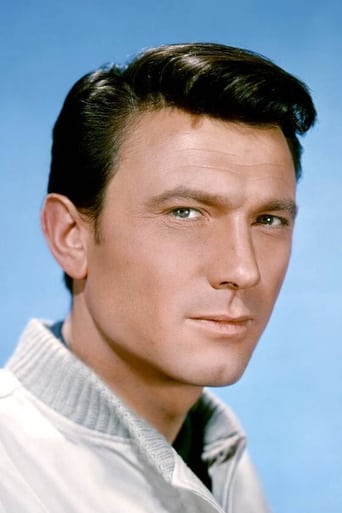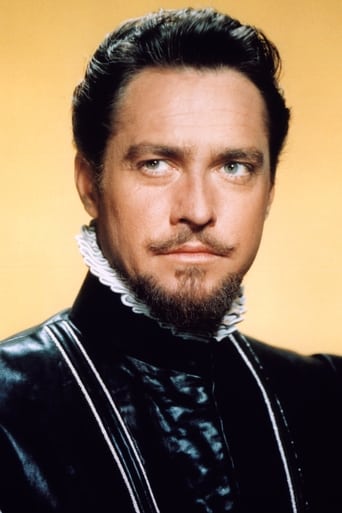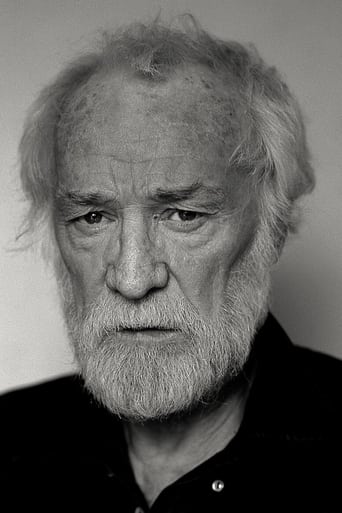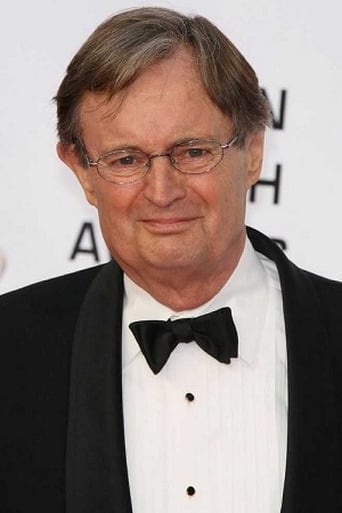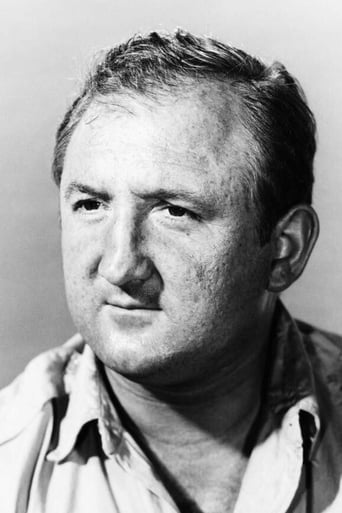Cubussoli
Very very predictable, including the post credit scene !!!
Ogosmith
Each character in this movie — down to the smallest one — is an individual rather than a type, prone to spontaneous changes of mood and sometimes amusing outbursts of pettiness or ill humor.
Cassandra
Story: It's very simple but honestly that is fine.
ianlouisiana
I saw the original stage play from which only Mr Kenji Takaki survived intact to reprise his role as the captured Japanese soldier whose presence presents a moral dilemma to a retreating British Army patrol in the Burmese jungle. The play was a cause celebre at the time because of its use of "barrack room" language,most of which except for the racial slurs you can now here on CBBC. Also,after a decade of uncritical portrayals of the British military,it presented an uncomfortable view of O.R. soldiers under pressure that retired colonels from Cheltenham were extremely unhappy with. Thus its success was ensured by a theatre audience whose make up was for more egalitarian than that of today. When it came to making the film the producers chose "Box Office" actors like Mr R.Todd and Mr L.Harvey for the showy roles where "acting" equated to shouting at the tops of their voices.A close second in terms of sheer volume came Mr R.Harris,with the tragically largely forgotten Mr R.Fraser in third place,several lengths behind. Mr Harvey,possibly the worst "Romeo" in cinema history was unaccountably popular for a brief while,possibly for his profligate use of Brycleem which was obviously hidden somewhere in his kitbag along with eyebrow tweezers and a nailfile. His one golden moment came in "Expresso Bongo" where he was a fast - talking jerk who was not so clever as he thought,a role he was born to play. And not so far removed from Pte Barmforth,whose cockney accent is as transient as his rationality. When the patrol capture the unfortunate Mr K.Takaki, Barmforth takes it upon himself to "civilise" the prisoner by shouting very loudly at him in English - jamais plus change. Mr R.Todd is the "tough" sergeant in charge of the patrol,another whose accent is of the temporary variety,a bit like Mr J.Mills when demoted to the Lower Deck. In real life Mr Todd had led men in battle so he knew at least something about military action which put him in a position of advantage over his fellow thesps,but he was too nice a man to point out their inadequacies,evidently.It's what being British was all about. Viewed from 50 - odd years distance,"The Long and the Short and the Tall"(a quote from the old Soldiers' song "F*** 'em all") may seem quaint and stagey,and,frankly,laughable in the days of sexed - up dossiers,suicide bombers and waterboarding,but it was a pretty big deal in 1961. To be honest I'd forgotten about it until I watched it on television yesterday afternoon. And I was straightaway transported back to the Theatre Royal,smoking My "Gitanes"(pretentious-moi?) with every chance of holding my girlfriend's hand for an hour if I contrived to miss the last bus home . That's worth a "7" in anybody's book.
tieman64
"The Long and the Short and the Tall" is a 1961 war drama by director Leslie Norman. Dated and plodding, the film watches as a platoon of British soldiers apprehend a Japanese scout during WW2's Malayan Campaign. The platoon then wrestle over questions of ethics. Some soldiers abuse the prisoner, some want him executed, whilst others rush to his defence. Laurence Harvey, who plays a gruff private, becomes the platoon's voice of conscience."Long" was once renowned for its foul language and gritty tone, but such things are passé today. The film's "do unto others as you'd have them do unto you" plot ends with a handful of British soldiers captured by the Japanesese, a "shocking" twist which is meant to jolt us into contemplation. This, unfortunately, has little to do with contemporary warfare. Today the shoe is never on the other foot, and it's no longer an issue of populaces failing to "empathise with the enemy", but rather, something far more toxic; the ability of men to rationalise war as something just, necessary and humane, the apathy of populaces, the designed distortion of history and the ability of leaders to remain at a state of perpetual war yet hide such conflicts from prying eyes. The philosophical questions "Long" poses have little bearing upon either modern warfare or WW2 itself. The film costars Richard Harris.4/10 – Slow and unconvincing. See "The Burmese Harp".
GI Joe
I've not given away the ending, but I do have major elements of the story on this report, although I've not given away the ending of the story.This movie is more into the behavior of soldiers, under stress and otherwise, and the commonalities they share with their enemies, than anything else. It centers around a squad of PSYCHOLOGICAL OPERATIONS (PsyOps) soldiers. They've been sent to the jungle as a sort of advance party with recordings of mechanized vehicles, troops drilling, etc. to scare away any would-be Japanese invaders to that particular island. Unfortunately, two things become apparent in short order, to quote one of the men "the recorded sounds must be loud enough to drown out jungle noises" and in this case they apparently weren't, and second and most important, the Japanese were already on the island. I won't give the remainder of the plot away, but some of it deals with the mistreatment of a captured Japanese soldier and how a member of that squad is later treated by his Japanese captors. Being a veteran of the US Army, and a witness to the many prejudices common to soldiers especially in war-time situations, I found this movie extremely interesting, important, and a must-see for anyone considering enlisting in the military especially for an MOS (military occupational specialty) which will put him or her in close proximity to the enemy-du-jour.For skeptics, this very tactic was used very successfully by TWO (2) CIA field operatives in the early 1950s against then communist Guatemala. The two CIA operatives, each at the end of a PRC25 radio, so convinced the Guatemalan army that they were the radio operators for entire armed, and numerically superior battalions of men, that they surrendered without a shot being fired. One of CIA's MANY unheralded successes, and a true story.
bob the moo
A group of soldiers are in the jungle recording sounds and testing levels for sonic warfare to be tried out on the Japanese at a later date. However, when radio operator private Whitaker can only pick up Japanese signals on his radio, he surmises that they must be within 15 miles of a Japanese camp.Tensions between the soldiers are raised as they start to protect themselves and plan to withdraw back to base – plans that change when they capture a lone Japanese soldier on patrol. As they debate what to do, the true characters of the men start to come out.I came to this thinking that this would be a low-key war movie and, in a way, I was right but it is less about war than it is about the true nature of its characters. In this way it is almost better described as social realism set in the Burmese jungle rather than anything else. The plot moves quite slowly and some modern audiences will likely struggle with the lack of fireworks in terms of acting and action for the majority of the running time but for my money I appreciated that the film took its time and developed broad characters only to then dismantle them when they are under pressure. In some regards the film isn't logical as it is more likely that the soldiers would have fled once the enemy closed in as opposed to fighting, but the play simply takes the struggle in all our souls and puts it into several different men, all making sense but not all making moral sense. It broods for a while but the point is there, building to a fine ending where the fireworks are supplied. The fact that the whole issue of treatment of POW's has come up yet again in Iraq (albeit more torture than necessity) ensures this film is still relevant but, even without the POW issue, the debate over morals and the question of 'what would you do' makes it interesting enough.The film feels a bit stagy due to the material and limitations of the time and budget but more due to the fact that this is a play. As a play, the material serves the actors well and they rise to meet it. Their performances are roundly strong even if they occasionally overplay it as if they were projecting to the back of a theatre where they really should have used the intimacy of cinema a bit better. Laurence Harvey is powerful in the plum role of Bamforth, the man who is anti-establishment etc but turns out to be the moral core of the group, Harris has a small role but is quality throughout. Todd has the most difficult role and manages it well even if he is given fewer acting 'high points' than some of the others. Support is good and everyone has their character, including good performances from McCallum, Ronald Fraser and the less well-known Meillon and Rees.Overall this is a dated, stagy film that may put off modern audiences unable to handle its slow pace and lack of action (for a war movie!) but this was an intelligent and interesting play and it has been put on the screen well. It is heavily cut of language and content due to the period it was made but this doesn't matter too much as it keeps the moral debate, with the men representing the various thoughts and impulses in all of us. It doesn't have a firm conclusion but to me that was part of its strength – with issues of some moral complexity there are rarely definite answers or solutions.
